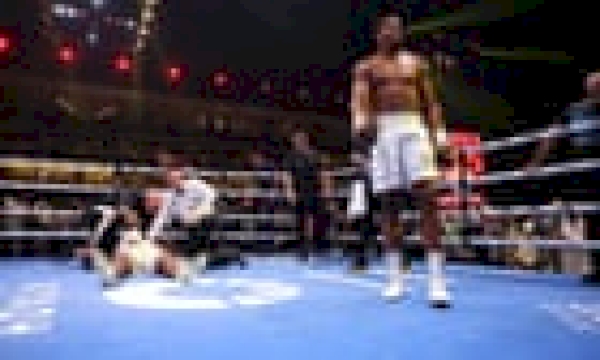The sudden end was as shocking as it was predictable. Francis Ngannou, a very good heavyweight champion in the contrasting world of mixed martial arts, walked slowly and unsteadily towards Anthony Joshua. He had already been knocked down twice before in only his second bout as a professional boxer. Joshua, an Olympic gold medallist and a two-time former heavyweight champion of the world, stepped forward to close the show. He knocked out the reeling novice with a cold and ruthless finish.
In the early hours of Saturday morning in Riyadh it was totally expected and yet still strangely alarming. Joshua had so much time he could plant his feet, take aim and unleash a ferocious overhand right that stuck Ngannou so forcefully on his temple that he began slipping into unconsciousness as he slumped to the canvas. Within seconds, he was stretched flat on his back. The referee, waving his left arm frantically to signal the fight was over in the second round, ran to his rescue.
Boxing thrives on such graphic violence which means that, even for those of us who somehow still love the courage, resolve and skill of its fighters, it is ultimately a bleak and often distressing business. Joshua, who has also been stopped shockingly by Andy Ruiz Jr and dismantled twice by Oleksandr Usyk, understands these harsh truths. He did not roar or celebrate Ngannou’s demise by climbing the ropes. Instead, Joshua looked away from his stricken opponent and walked quietly across to his new trainer, Ben Davison, who tapped his glove in acknowledgment of a brutal job done well.
They were right not to indulge in jubilation. Joshua did his work with clinical efficiency while showing some of the spite that all great heavyweights carry inside. Mike Tyson used to produce these stoical reactions better than any other fighter. After he had obliterated yet another hapless opponent, Tyson would trudge around the ring with a contemptuous lack of surprise. A sombre expression reflected his certainty that the outcome had always been obvious. It was chilling and intimidating and built the myth of Iron Mike.
But Tyson was lost in a dark maze. He eventually unravelled outside the ring and between the ropes. Joshua, a student of heavyweight boxing, has immersed himself in these compelling yet quietly tragic stories – and lived through the pain of his own defeats.
Let Us Build Your Online Success!
We are the experts in creating visually stunning and functional websites. With reliable hosting and exceptional customer support, we bring your vision to life. Join hundreds of happy clients who trust us!
Get Started Now📞 Call/WhatsApp: +256 207 800 192
Joshua also knew, as long as he prepared hard and fought with calm intent, he would blow Ngannou away. He has been boxing professionally for 10 years and 10 months, while it is just over four months since Ngannou’s pro debut.
Boxing logic had been skewed on that surreal night last October when, in his first fight as a boxer, Ngannou stunned Tyson Fury by dropping him in the third round. Fury got up and shaded a split-decision victory. Ngannou performed admirably and yet Fury had been lethargic and bereft of his usual cascade of trickery.

It turned out to be a mirage as Joshua crushed Ngannou in the desert of Saudi Arabia. His promoter, Eddie Hearn, resorted to the exaggeration that Joshua shunned. “You’re looking at the baddest man on the planet,” Hearn said, stealing one of Tyson’s old nicknames as he pointed to Joshua. “He’s the best heavyweight in the world, and I can’t wait for him to beat Tyson Fury.”
Hearn’s statement was almost as absurd as the very idea of these crossover fights. Fury, of all people, spoke with composed good sense as he responded to Hearn’s bombast: “I’m sure Oleksandr Usyk will have something to say about that, considering that he beat [Joshua] twice. It’s me and Usyk who fight for the No 1 and No 2 positions and the undisputed championship of the world [in May]. I had a shit performance against Ngannou. I’ve never said anything different. Joshua knocked him out and that’s what a boxer should’ve done.”
Usyk holds the IBF, WBA and WBO world heavyweight titles, while Fury retains his WBC belt. Their compelling bout is the real deal and should confirm boxing’s first undisputed world heavyweight champion of the 21st century. The last man to claim that exalted status, in 1999, was Lennox Lewis, another great fighter who added to the ruin of Tyson.
after newsletter promotion
It has been a week in which Joshua restored some order and clarity to boxing – by underlining the dangerous folly of such crossover bouts. They should not be allowed because lasting damage may yet happen.
Of course, as this is boxing, a grim announcement was made the day before Joshua faced Ngannou. On 20 July, Jake Paul, the YouTube influencer turned professional boxer, will fight Tyson in “a blockbuster exhibition” at the AT&T Stadium in Arlington, Texas. It is predicted that the stunt of a bout, to be streamed live on Netflix, will draw a crowd of 80,000 and generate more than $100m. Tyson will have just turned 58.
Hearn, who has promoted YouTube scraps before, described the news as “very sad. It’s a big event but that particular fight, for real lovers of the sport, is sad to see.”
For all the hard-edged realism Joshua doled out just before 3.30am on Saturday morning, the madhouse of boxing roars on. But, at the dead of night, we were reminded that only real boxers should occupy such perilous terrain.

